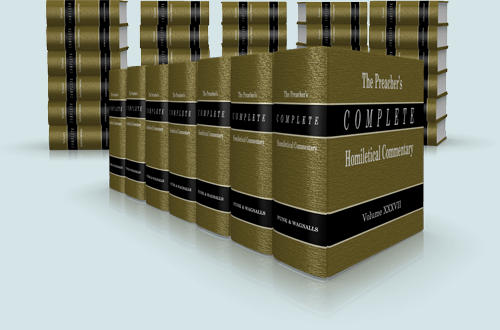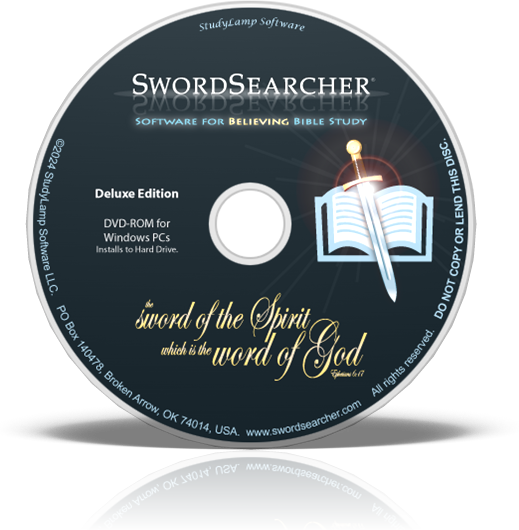The Preacher's Complete Homiletical Commentary

The Preacher's Complete Homiletical Commentary, by Joseph Exell, William Jones, George Barlow, W. Frank Scott, and others, was published in 37 volumes as a sermon preparation and study resource. It is a commentary "written by preachers for preachers" and offers thousands of pages of:
- Detailed illustrations suitable for devotional study and preaching
- Extensive helps in application of Scripture for the listener and reader
- Suggestive and explanatory comments on verses
- Theological outlines of passages
- Expository notes
- Sketches and relevant quotes
- Brief critical notes on chapters
Although originally purposed as a minister's preparation tool, the Preacher's Complete Homiletical Commentary is also a fine personal study supplement.
With SwordSearcher you can search the entire commentary for any word or phrase, and every verse reference is instantly linked and available in the Verse Guide and can be included in the Bible margin.
Here is a sample of the homiletics from Psalm 14:
The Immorality of Atheism (Verses 1–3.)
I. It is immoral in its principle.
It is the denial of the existence, an ignoring of the rights, of the Absolute and Eternal King. Sceptics often talk of the rights of man; but they end with the essential immorality of denying the crown rights of God. He made us; He made the world, and all that is in it; and to deny His existence and to ignore His government is profoundest immorality. "Sin, if unchecked, would go to the extinction of all being, and of God Himself. There is no doubt that all sin designs deicide. All sin is directed against universal being. It is primarily against God, inferentially against all being. All transgression is ambitious, and, if it could succeed, it would scale the universe and dethrone its Monarch."—Duncan. Atheism is the essence of ingratitude, injustice, lying, pride, hatred, and selfishness.
II. It is immoral in its origin.
"They are corrupt." It does not spring from a pure and honest intellect, which finds itself perplexed by a problem too great for it, but from a proud and corrupt heart. "Passion, not reason, generates atheism. Sin suggests a dislike of Providence, and reason is then marshalled to drive Him out of our view."—Rylands. "Their foolish heart was darkened" (Ro 1:21). The child recognises God, but, giving place for long years to worldliness and sin, the man sinks into practical atheism. He lives so long without God in the world, that at last he ventures to think that there is no God. And so a nation as it increases in wealth, and luxury, and power, becomes self-sufficient; and the outcome of this is a general prevalence of speculative and practical atheism. We wrong God, and then we forget Him; we forget Him, and then we deny Him.
III. It is immoral in its consequences.
Sin leads to scepticism, and scepticism to sin. With the denial of God we lose the principle of moral life and beauty. 1. Personally we become "corrupt." Belief in God is the salt of human nature, and when that has gone the whole man rapidly corrupts. 2. And our works become "abominable." He who has smothered in his heart the knowledge of God, has lost the vital principle of health, beauty, life, and usefulness. "The fool, is a term in Scripture signifying a wicked man; the word signifies the extinction of life in men, animals, and plants; so the word is taken Isa 40:7, 'The flower fadeth;' a plant that hath lost all that juice that made it lovely and useful. So a fool is one that hath lost his wisdom and right notion of God and divine things, which were communicated to man by creation; one dead in sin."—Charnock. Atheism cannot create a noble manhood. It creates a fool. Religion and right reason gone, natural principles extinct, what can you have but a distorted and ignoble humanity? Atheism cannot create a noble nation. Without God, man rots; without God, society rots. Atheism is the greatest immorality. "Folly is a term employed in Hebrew to signify the greatest possible degree of guilt."—French. "The Psalmist makes this prominent as the very extreme and depth of human depravity, that there can be among men those who deny the existence of a God."—Delitzsch. It is the source of all immoralities; and God will punish it with great retribution (ver. 5).
37 volumes, FUNK & WAGNALLS COMPANY, 1892.
HOMILETICAL, a. Gr. to converse in company.
1. Pertaining to familiar intercourse; social; conversable; companionable.
2. Homiletic theology, a branch of practical theology, which teaches the manner in which ministers of the gospel should adapt their discourses to the capacities of their hearers, and pursue the best methods of instructing them by their doctrines and examples. It is also called pastoral theology.
This text is part of the SwordSearcher Deluxe Study Library.
Module type: Commentary
Module abbreviation: PHC
The Deluxe library includes hundreds of volumes. Discover how fast, convenient, and powerful software is compared to mere online study tools.
See also:

